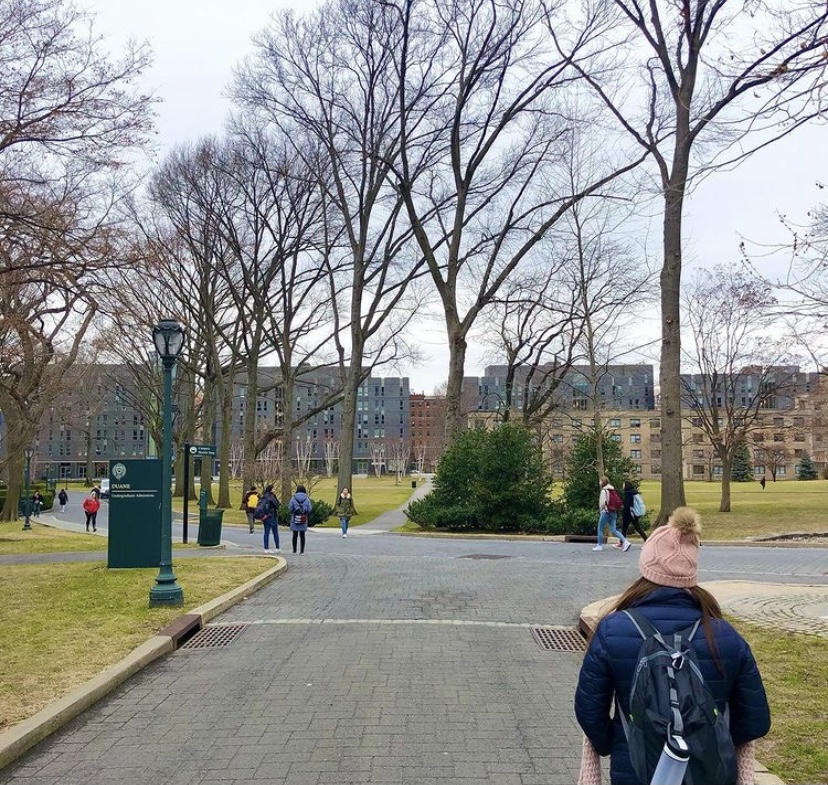Fordham Students Battle Isolation and Loneliness During COVID-19 Pandemic
The ongoing COVID-19 pandemic and the effects it has had on classes and student gatherings have caused many Fordham students to feel more isolated from their professors and peers, raising concerns about students’ mental health during the upcoming semester.
Beginning in the fall semester, the university implemented new COVID-19 policies — like mask requirements, restrictions on in-person gatherings and the option to take courses virtually — in order to prevent the spread of coronavirus on campus. Those policies have continued into the spring semester as COVID-19 cases remain high nationwide.
Some Fordham students report feeling emotionally isolated after a fall semester of limited in-person interactions with both professors and peers. “Being a freshman and attempting to make friends in the midst of a pandemic was really difficult and frustrating,” said Cate Harding, FCRH ’24. “I don’t feel that I have any sort of relationships with my classmates or professors. Without the element of being in-person there isn’t much of a way to create connections.”
Jamison Rodgers, FCRH ’24, said she also struggled to connect with the rest of the Fordham community. “I don’t feel like I know the people in my classes, or my professors, very well and that could pose a problem if I need a reference for a job,” said Rodgers. “It also just affects the dynamic of the class, because no one knows each other.”
In addition to some classes moving fully online, inter-dorm visitation is currently prohibited, according to the Fordham Forward guidelines. Everywhere on campus, with the exception of a space shared between roommates, students are expected to maintain a safe social distance and wear face masks at all times, according to the university’s guidelines. Lounge capacities have been capped and the hours of common areas such as the RamFit Center have been modified for equipment to be sanitized on one-hour intervals. These social distancing rules also apply off campus, where students are expected to refrain from high-risk activities and large in-person gatherings. Before returning to campus this spring, each Fordham student had to sign the Ram Pledge again, acknowledging that failure to comply with the aforementioned COVID-19 policies may result in loss of housing, removal from campus and “loss of guest privileges, educational sanctions, probation or other disciplinary sanctions.”
Many students like Harding and Rodgers try to take advantage of the lounges, common areas and libraries, but a significant number also take Zoom classes in their bedrooms, sometimes from their bed. Online classes have led many students to feel that their existences are cyclical and mundane: wakeup, open laptop, eat, sleep and repeat, all within the same four walls. Some reported leaving their rooms only for food and restroom breaks. Ordinarily, these habits might worry family members and friends of the person exhibiting them. However, for students in 2021, this experience isn’t so surprising.
Dr. Jeffrey Ng, director of Counseling and Psychological Services said student isolation was a concern for him and other mental health professionals at Fordham. “On the one hand, I totally get it,” said Ng. “It’s the default way of interacting right now if learning is remote and from afar. It’s understandable that might slip into being the pattern. At the same time, that’s not healthy, physically, psychologically, mentally or emotionally.”
Ng indicated there was also a concern that students who had struggled with mental health before the pandemic were experiencing even more difficulties with online schooling than the average student. “Because of all the challenges associated with the pandemic, including the shift to doing things more virtually, there are some students who are more vulnerable to feeling socially disconnected and isolated,” said Ng.
For students experiencing such isolation, Ng recommended that they identify people with whom they have supportive and positive relationships. He also said students should take advantage of the safe in-person opportunities offered by the university, even if it feels easier to stay in your room, not get dressed and take classes from bed.
Ng also strongly recommended that Fordham students keep their Zoom cameras on during online classes. Hiding the “self-view” feature on Zoom can help students feel more comfortable with their camera remaining on and promote better academic and interpersonal engagement. Outside of class, Ng said students should try to engage with their friends virtually and interact through online video games or interactive virtual platforms like Netflix Party. Fordham students can learn more about safely connecting to peers during the coronavirus pandemic in the online presentation “Wired for Connection: Risk Reduction Strategies for Cultivating Relationships & Intimacy” created by Ng and other staff members at CPS.
Any student needing further assistance with feelings of loneliness or isolation should reach out to Counseling and Psychological Services at (718) 817-3725 for the Rose Hill office and (212) 636-6225 for Lincoln Center.










































































































































































































